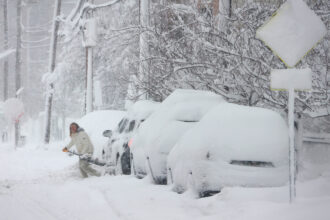A federal judge has set a trial date for the landmark lawsuit brought by 21 children and young adults over the U.S. government’s alleged failure to rein in fossil fuel development and address climate change.
The trial will start on Feb. 5, 2018, in federal district court in Eugene, Oregon, with Judge Ann Aiken, court documents show.
Filed in 2015, the lawsuit, Juliana et al v. United States, seeks sweeping changes in federal climate change efforts and in government programs that subsidize or foster the development of fossil fuels. A decision on the lawsuit by Judge Aiken could come once the trial ends some time in the spring of 2018, though the case is expected to be appealed by both sides possibly to the Supreme Court, likely delaying the final outcome for years. Its advancement to trial means that decades of federal policy on fossil fuels and climate change—including information that had previously been unknown or hidden—could come under public scrutiny.
The judge also granted a request made in late May by the country’s biggest fossil fuel lobbies to withdraw from the case.
In November 2015, the American Petroleum Institute (API), the American Fuel & Petrochemical Manufacturers (AFPM) and the National Association of Manufacturers (NAM) joined the federal government’s side of the case as intervenors, explaining that the lawsuit was a “direct threat” to their businesses.
The intervenors and the Justice Department repeatedly filed motions to have the case dismissed, but federal judges ruled against them and allowed the lawsuit to proceed.
The lawsuit has been in the discovery phase since the start of the year, a period when each side seeks documents, deposes witnesses and gathers other evidence to build its argument. The fossil fuel lobbies’ departure from the case appears to shield them from that process. But the plaintiffs’ lawyers plan to “to depose representatives of the U.S. government defendants, and we have served them with notice of some of those depositions,” said Julia Olson, co-lead counsel for the plaintiffs and executive director of Our Children’s Trust, an Oregon-based environmental group.
It remains unclear if the plaintiffs will seek to depose Secretary of State Rex Tillerson. Tillerson, formerly chairman and chief executive of ExxonMobil, also served as president of API. Both entities spent millions of dollars on campaigns to sow doubt among the public and lawmakers about climate change. Olson said that the plaintiffs have not served Tillerson with a deposition notice yet.
The information the plaintiffs gather in the discovery phase could potentially damage the reputation of the government or the fossil fuel industry long before the court renders a decision. “Evidence will be made public at trial, and possibly before,” Olson said.
The young plaintiffs will also likely be deposed by lawyers from the Trump administration Justice Department, but they said they welcomed the progress of the case. “I’m excited that we have a date now,” said Jayden Foytlin, 14, of Rayne, Louisiana. “I think we are all looking forward to our day in court. I feel like we are that much closer to justice.”
The Department of Justice declined to comment about the significance of the trial date.
Juliana is based on a legal concept called the public trust doctrine, which argues that the government holds resources such as land, water or fisheries in trust for its citizens. Climate litigators contend that the government is a trustee of the atmosphere, too. The doctrine’s power flows from the Fifth, Ninth and Tenth Amendments, and the Vesting, Posterity and Nobility Clauses of the Constitution, the plaintiffs maintain.
In 2015, environmental plaintiffs in the Netherlands, South Africa and Pakistan, as well as Massachusetts and Washington state, won similar human rights or constitutional cases that force authorities to more aggressively cut carbon emissions.
The plaintiffs in Juliana argue that the federal government has known for at least 50 years that combustion of fossil fuels adds carbon dioxide to the atmosphere and changes the climate. Because it chose not to limit fossil fuel use and cut greenhouse gases, the government violated the plaintiffs’ right to protection from environmental degradation under the trust doctrine, the suit alleges.
“The overarching public trust resource is our country’s life-sustaining climate system, which encompasses our atmosphere,” the Juliana pleading says. “As sovereign trustees, Defendants have a duty to refrain from ‘substantial impairment’ of these essential natural resources.”
About This Story
Perhaps you noticed: This story, like all the news we publish, is free to read. That’s because Inside Climate News is a 501c3 nonprofit organization. We do not charge a subscription fee, lock our news behind a paywall, or clutter our website with ads. We make our news on climate and the environment freely available to you and anyone who wants it.
That’s not all. We also share our news for free with scores of other media organizations around the country. Many of them can’t afford to do environmental journalism of their own. We’ve built bureaus from coast to coast to report local stories, collaborate with local newsrooms and co-publish articles so that this vital work is shared as widely as possible.
Two of us launched ICN in 2007. Six years later we earned a Pulitzer Prize for National Reporting, and now we run the oldest and largest dedicated climate newsroom in the nation. We tell the story in all its complexity. We hold polluters accountable. We expose environmental injustice. We debunk misinformation. We scrutinize solutions and inspire action.
Donations from readers like you fund every aspect of what we do. If you don’t already, will you support our ongoing work, our reporting on the biggest crisis facing our planet, and help us reach even more readers in more places?
Please take a moment to make a tax-deductible donation. Every one of them makes a difference.
Thank you,













